Sponsored Post – from the City of Austin Office of Sustainability
Tom is passionate about the environment and enjoys exploring the intersection of energy conservation and business. He is eager to demonstrate the advantages solar power can have for the food truck industry — even offering to assist other businesses for free!
We spoke with Tom about his commitment to Net-Zero, what his toughest challenges have been, what advice he has for others, and why his business is about more than just shaved ice. Read more below.

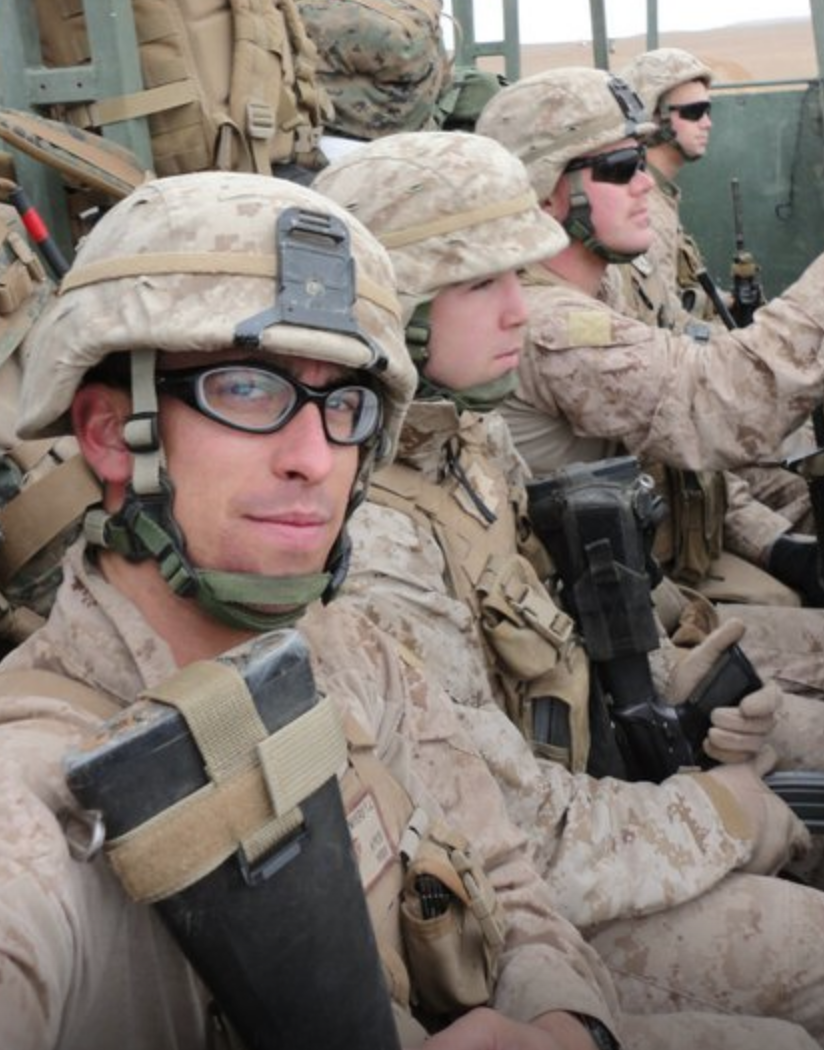
I deployed to Afghanistan as a Logistics Officer in the United States Marine Corps in 2010. One of my responsibilities was managing maintenance and operation of 120 diesel generators across 56 patrol bases. The generators provided power to everything from advanced communications equipment to coffee pots. The upkeep of this grid of diesel generators required a lot of maintenance, planning, training, and re-distribution.
During the course of the six-month deployment, there was a big emphasis on making the vehicle resupply convoys more efficient to lower exposure to the dangers of the battlespace. Several Marines from our unit were catastrophically wounded and one was killed during the six-month period where over 700 IEDs were unearthed.
Ninety miles to the north, a unit called Dark Horse 3/5 was also involved in a program called “ExFOB”, which stood for Experimental Forward Operating Base. The program was designed to incorporate the use of solar panels to reduce fuel consumption and lower the exposure of vehicle re-supply convoys to the dangers of IEDs and ambushes while delivering food, fuel, and supplies. Even with the incorporation of the ExFOB program, Dark Horse 3/5 still experienced severe casualties totaling 25 killed and 184 wounded — the highest casualty rate of any Marine Corps unit in Afghanistan.
The detailed maintenance planning and logistical coordination quickly translated into a responsibility that could save lives. As our unit wrestled with the challenges of the maintenance-intensive diesel generators, I grew increasingly interested in the practices of the ExFOB program, and alternative forms of energy production and storage. I spent my limited spare time studying the early stages of Tesla Motors, Elon Musk, and his endeavors to transition the world to a carbon-free future.

I returned to Austin in the Spring of 2011, eager to see friends and family post-deployment. I visited my friend, Chad Fairman to catch up. Chad and I had co-owned two Hawaiian shaved ice food trailers together during our undergraduate years, and we sold the business to my father when I left for the Marine Corps. As I spoke to Chad about my experiences in Afghanistan, I talked about the challenges we faced and the capabilities of different forms of clean energy stating, “If we ever do shaved ice again, we should figure out a way to do it with solar panels.” My experience in Afghanistan, pre-disposition as an entrepreneur, and the world’s call to action regarding climate change shifted my focus to the intersection between sustainability and business.
Not only does solar have many advantages for the environment, but it also offers incredible advantages for food trucks, where your location is everything and the competition is fierce. From our past experience with shaved ice, we learned that often the best location is not feasible because of lack of power access. With solar panels, we are able to re-create the benefits that were present 10-15 years ago in food trucks, like plentiful real estate locations and inexpensive rent. Being off-grid and solar powered, we now have innumerable real estate options and no competition that share the same capabilities.
Deciding to start a business was a tough decision, let alone a business dependent on off-grid solar technology. With the financial help of a mentor, my father, and my own savings, the construction of the first prototype started in February of 2017. The process was full of roadblocks and hiccups, as we didn’t even know how much battery, how many solar panels, or what inverting capability we would need to run our utilities. We learned a lot throughout the process, and recently built two more off-grid trailers that have larger battery banks, solar arrays, power inverters, and many other small but impactful modifications.
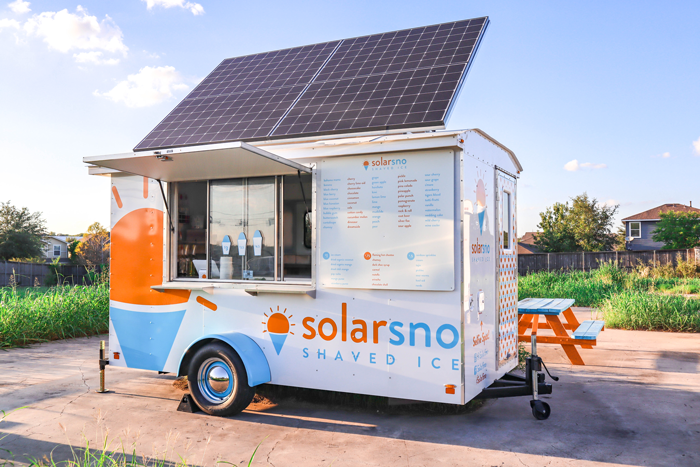
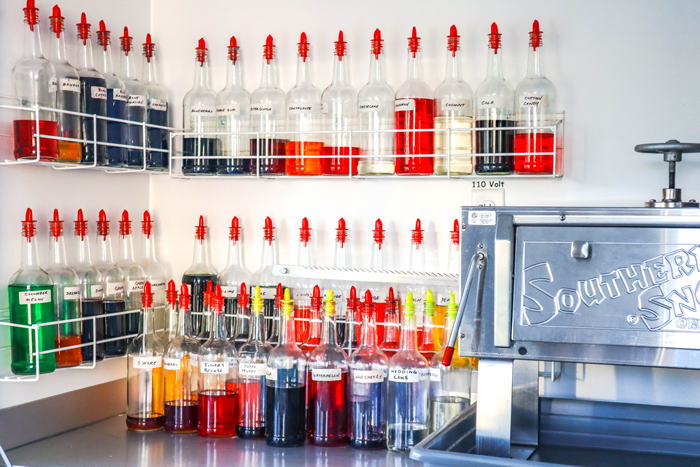

The toughest part was finding talent to consult with and assist in the design process of an off-grid system that could power the trailer for a seven to nine-hour day. At one point, I took my trailer and sat in the parking lot of a local solar supply warehouse and waited for contractors to pull up. I asked any and every contractor willing to talk to me if they would be interested in assisting me. I worked with six different solar installers before I found an off-grid specialist to answer my questions and assist with the system design and final wiring.
The world of off-grid solar is still in its infancy and current tax subsidies apply only to grid-connected solar. The contractors and installers that I spoke to were incredibly busy installing residential solar systems and had little time to dedicate to such a small project with such loaded schedules.
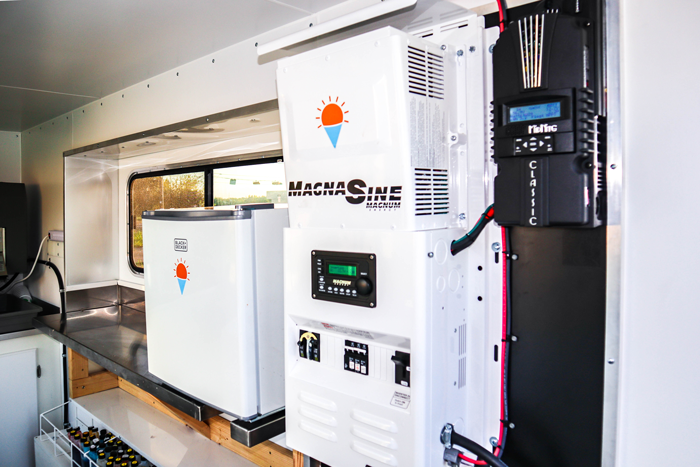

Meeting our amazing customers and other business leaders in Austin who share our commitment to the environment and care about what we are doing. Everyone in Austin loves shaved ice. Adding the off-grid solar component to the experience opens the door for many different and interesting opportunities to talk to people about the larger narrative around the environment, sustainability, and business.
We are working to represent a larger mission that prioritizes more than just the bottom line. There are a lot of people in this city that care about our responsibilities, the future of our planet, and what the businesses they patronize represent. We are more than just shaved ice, and our customers and followers are more than just consumers. We are a better business and community for the relationships we have created in the name of progress for our planet. There are few better feelings than to know that progress is the real business we are in.
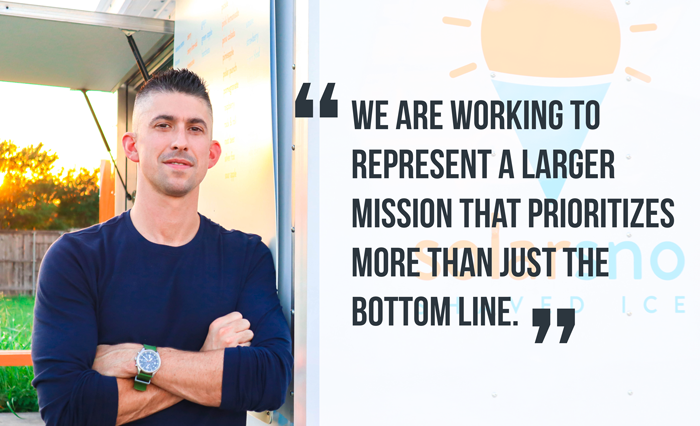

Contact me. Let me help you go solar, for free. SolarSno is the first to go off-grid in Austin, but it is not our mission to be the only one. Like Elon Musk of Tesla, who opened all of his patents to the public, we are not interested in keeping the advantages of our net-positive carbon-free operation to ourselves. Find me on Facebook or Instagram @solarsno to start a conversation regarding your off-grid strategy. We will help you source component suppliers, system design, and sub-contractor information. We think the food truck community is in an interesting position to lead the way in sustainable business practices that can serve as a model for larger entities to follow. We are incredibly eager to share the empowerment and satisfaction that we have experienced in the last two years of hard work, with a larger focus to make a difference and save our planet. #shaveourplanet
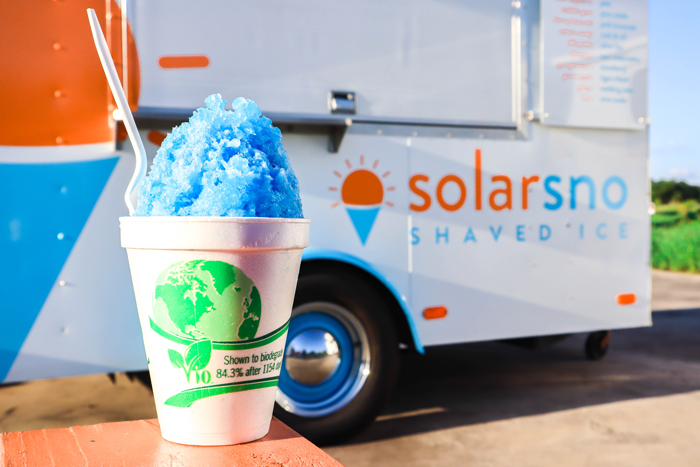
To learn more about Austin’s Net-Zero Goal, view the Community Climate Plan.
Share your Net-Zero contributions with us on Twitter or Facebook and use #NetZeroHero. If you know a Net-Zero Hero (or heroes!) who should be recognized for their efforts, send your nomination to sustainability@austintexas.gov.
Please note – editorials and sponsored posts are written by guest writers to inform and educate the community on a variety of different viewpoints, as well as to share information about local eco-friendly businesses and organizations. However, they do not necessarily reflect the opinions of the Austin EcoNetwork.

